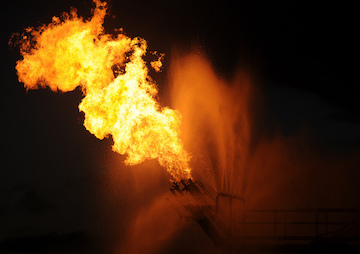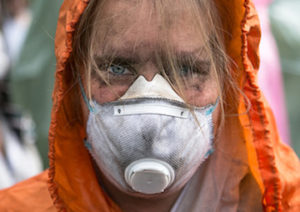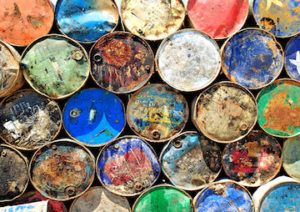The Desperate Plight of Petrostates
Once so wealthy from oil sales that they could finance wars, megaprojects, and domestic social peace simultaneously, Russia, Saudi Arabia and others are now beset by internal strife or are on the brink of collapse as oil prices remain at ruinously low levels. Deepwater Horizon Response / CC BY-ND 2.0
1
2
3
Deepwater Horizon Response / CC BY-ND 2.0
1
2
3
In the cold light of day, however, the country still needs those oil revenues for the lion’s share of its income, which means that in the current low-price environment it has ever less money to fight Boko Haram, pay for social services, or pursue alternative investment schemes. In addition, Buhari has been accused of disproportionately targeting southerners in his fight against corruption, sparking not just fresh discontent in the Delta region but the rise of a new militant group — the Niger Delta Avengers — that poses a threat to oil production. On May 4th, the Avengers attacked an offshore oil platform operated by Chevron and the Nigerian National Petroleum Corporation, forcing the companies to shut down production of about 90,000 barrels per day. Add that to other insurgent attacks on the country’s oil infrastructure and the Nigerian government is expected to lose $1 billion in May alone. If repairs are not completed on time, it may lose an equal amount in June. It remains a nation on edge, in danger of devastating impoverishment, and with few genuine alternatives available.
Saudi Arabia: Seeking a New Vision
With the world’s second largest reserves of oil, Saudi Arabia is also the planet’s leading producer, pumping out a staggering 10.2 million barrels daily. Originally, those massive energy reserves were owned by a consortium of American companies operating under the umbrella of the Arabian-American Oil Company (Aramco). In the 1970s, however, Aramco was nationalized and is now owned by the Saudi state — which is to say, the Saudi monarchy. Today, it is the world’s most valuable company, worth by some estimates as much as $10 trillion (10 times more than Apple), and so a source of almost unimaginable wealth for the Saudi royal family.
For decades, the country’s leadership pursued a consistent political-economic business plan: sell as much oil as possible and use the proceeds to enrich the numerous princes and princesses of the realm; provide lavish social benefits to the rest of the population, thereby averting popular unrest of the “Arab Spring” variety; finance the ultra-conservative Wahhabi clergy so as to ensure its loyalty to the regime; finance like-minded states in the region; and put aside money for those rainy-day periods of low oil prices.
Saudi leaders have recently come to recognize that this plan is no longer sustainable. In 2016, the Saudi budget has, for the first time in recent memory, moved into deficit territory and the monarchy has had to cut back on both its usual subsidies to and social programs for its people. Unlike the Venezuelans or the Nigerians, the Saudi royals socked away enough money in the country’s sovereign wealth fund to cover deficit spending for at least a couple of years. It is now, however, burning through those funds at a prodigious rate, in part to finance a brutal and futile war in Yemen. At some point, it will have to sharply curtail government spending. Given the youthfulness of the Saudi population — 70% of its citizens are under 30 — and its long dependence on government handouts, such moves could, in the view of many analysts, lead to widespread civil unrest.
Historically, Saudi leaders have been slow to initiate change. But recently, the royal family has defied expectations, taking radical steps to prepare the country for a transition to what’s being termed a post-petroleum economy. On April 25th, the powerful Deputy Crown Prince, Mohammed bin Salman, unveiled “Saudi Vision 2030,” a somewhat hazy blueprint for the kingdom’s economic diversification and modernization. Prince Mohammed also indicated that the country will soon begin to offer public shares in Saudi Aramco, with the intention of raising massive funds to invest in and create non-oil-related Saudi industries and revenue streams. On May 7th, the monarchy also abruptly dismissed its long-serving oil minister, Ali al-Naimi, and replaced him with the head of Saudi Aramco, Khalid al-Falih, a figure deemed more subservient to Prince Mohammed. Falih’s job title was also changed to minister of energy, industry, and mineral resources, which was (so the experts speculated) a signal from the monarchy of its determination to move beyond exclusive reliance on oil as a source of income.
This is all so unprecedented that there is no way of predicting whether the Saudi royals are actually capable of bringing anything like Saudi Vision 2030 to fruition, no less moving away in a serious fashion from its reliance on oil. Many obstacles remain, including the possibility that jealous royals will push Prince Mohammed (and his vision) aside when his father, King Salman, now 80, passes from the scene. (There are regular rumors that some members of the royal family resent the meteoric rise of the 31-year-old prince.) Nevertheless, his dramatic statements about the need to diversify the kingdom’s economy do show that even Saudi Arabia — the petro-state par excellence — now recognizes that some kind of new identity is now a necessity.
The Stakes for Us All
You may not live in a petro-state, but that doesn’t mean you don’t have a stake in the evolution of this unique political life form. From at least the “oil shock” of 1973, when the Arab OPEC members announced an “oil boycott” against the U.S. for its involvement in the Yom Kippur War, such countries have played an outsized role on the world stage, distorting international relations, and — in the Greater Middle East — involving themselves (and their financial resources) in one conflict after another from the Iran-Iraq War of 1980-1988 to the wars in Yemen and Syria today.
Their fervent support for and financing of favored causes — whether it be Wahhabism and associated jihadist groups (Saudi Arabia), anti-Westernism (Russia), or the survival of the Assad regime in Syria (Iran) — has provoked widespread disorder and misery. It will hardly be a tragedy if a lack of funds forces such states to pull back from efforts of this sort. But given the centrality of fossil fuels to our world for the last century or more, the chaos that could ensue in the oil heartlands of the planet from low oil prices and high supply is likely to create unpredictable new nightmares of its own.
And the greatest nightmares of all lurk not in any of this but in the inability of these states and those they supply to liberate themselves from reliance on fossil fuels fast enough. Looking into the future, the demise of petro-states as we’ve known them could have a profound impact on the struggle to avert catastrophic climate change. Although these states are not primarily responsible for the actual combustion of fossil fuels — that’s something we in the oil-importing countries must take responsibility for — their pivotal role in fueling the global petroleum economy has made them largely resistant to international efforts to curb emissions of carbon dioxide. As they try to repair their busted business model or collapse under the weight of its failures, we can only hope that the path they follow will entail significantly less dependence on oil exports as well as a determination to speed up the conclusion of the fossil fuel era and so diminish its legacy of climate disaster.
Michael T. Klare, a TomDispatch regular, is a professor of peace and world security studies at Hampshire College and the author, most recently, of The Race for What’s Left. A documentary movie version of his book Blood and Oil is available from the Media Education Foundation. Follow him on Twitter at @mklare1.
Follow TomDispatch on Twitter and join us on Facebook. Check out the newest Dispatch Book, Nick Turse’s Next Time They’ll Come to Count the Dead, and Tom Engelhardt’s latest book, Shadow Government: Surveillance, Secret Wars, and a Global Security State in a Single-Superpower World.
Copyright 2016 Michael T. Klare Your support matters…Independent journalism is under threat and overshadowed by heavily funded mainstream media.
You can help level the playing field. Become a member.
Your tax-deductible contribution keeps us digging beneath the headlines to give you thought-provoking, investigative reporting and analysis that unearths what's really happening- without compromise.
Give today to support our courageous, independent journalists.






You need to be a supporter to comment.
There are currently no responses to this article.
Be the first to respond.